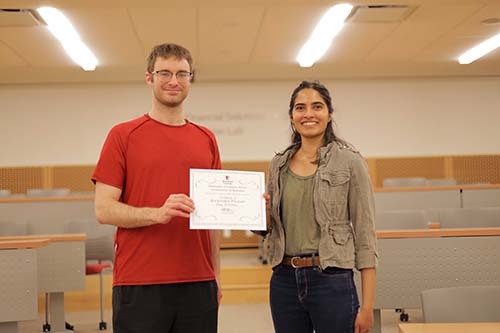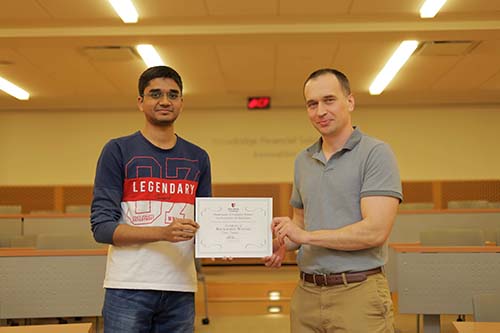On April 23, 2023 the Stony Brook University Department of Computer Science hosted its first generative AI hackathon organized by Professor Stanley Bak.
Large language models such as ChatGPT and Bard are able to generate complex and creative text outputs from English prompts. While the technology is sometimes amusing, it also has the potential for more productive use. In particular, the language models are adept at creating 100-200-lines of computer code from a few sentences of an English language description. Creating programs that may have previously required several hours of manual coding.
“This ability has the potential to transform the software engineering industry,” says Bak. However, the future is far from certain. The perception of providing a one sentence description to produce a professional-looking website or a mobile phone app currently conflicts with reality.
Throughout the event, students encountered two common problems with generative AI coding: (1) it was difficult to have AI work on more complex programs that required programs longer than 100-200 lines, and (2) the code it generated would sometimes contain subtle bugs that were difficult to debug. “There is no course right now on how to best use generative AI for coding, since technology is so new,” Professor Bak added.
The hackathon lasted three hours and students organized into groups, where the task consisted of using generative AI to write complex programs. The theme centered around programs that would be useful or fun for elementary school students. With mixed success, the student teams designed projects including shape sorting programs, knowledge quiz review, and math versions of snakes and ladders.
The winner of the event, Akash G, was awarded $100 for DrawApp, a program aimed to help students practice handwriting. The program consisted of several AI-generated parts, including code to download training data and create a neural network to do handwriting recognition. It allowed users to draw letters inside a web browser and a Flask-based python backend took the user-drawn image and saved it as a .jpg file, converted the input into the expected format and ran the neural network, which then provided feedback based on the output to the user. Akhash’s AI-generated source code is available here.
The runners-up were Veena Krish and Matthew Castellana who received a $50 prize. Their program consisted of a geography quiz program where the user tried to identify famous cities from an image downloaded using a generative AI program, along with a short description written by ChatGPT.
Scenes from the Generative AI hackathon:-



